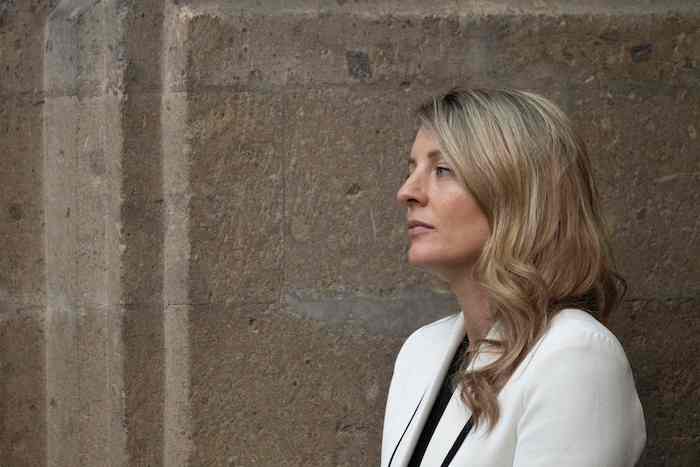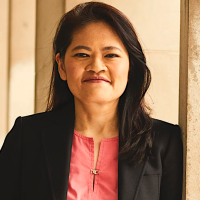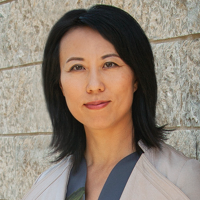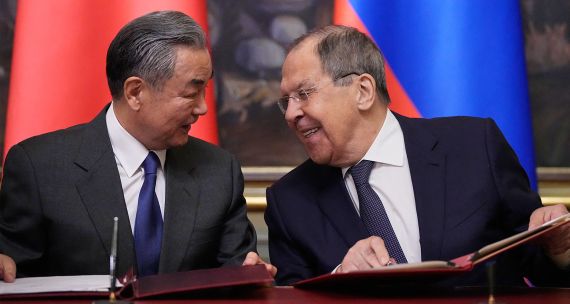Lynette H. Ong: Not Out of the Woods Just Yet
Canadian Minister of Foreign Affairs Mélanie Joly’s trip to Beijing from July 18–20, 2024, was the first official visit by a Canadian foreign minister since the arrest of Huawei’s CFO and the “two Michaels” in 2018 that sent bilateral relations into a deep freeze.
Though the visit by no means signals a thaw in relations, it carries several significant implications. In the years when the two Michaels were held by the Chinese authorities, and our key exports to China were punished by arbitrary non-tariff barriers, the Canadian government made several attempts to send a delegation to Beijing to negotiate to no avail.
So, why the Canadian foreign minister’s visit now? We will never know for sure. But Beijing is more isolated today and the Chinese economy is in worse shape than it was several years ago. Recent Pew surveys have indicated strong unfavourable ratings against China, a consistent pattern across all democratic countries. The U.S. has imposed various restrictions to limit the growth of Chinese high-tech industries and has slapped a 100 per cent tariff on Chinese electric vehicle (EV) exports, one of the few bright spots in the Chinese economy. The European Union is also contemplating imposing similar tariffs on the heavily subsidized Chinese EV exports, and Canada has recently made known its intention to follow in the footsteps of the U.S. and EU.
We also saw a thaw in China-Australia relations in the past year. Australia was punished for a former prime minister’s criticism of Beijing’s handling of the COVID-19 outbreak, which resulted in China’s imposition of similar non-tariff barriers on Australian exports and the arrests of several Australians — an eerily familiar pattern that has played out between China and smaller countries when it is displeased with their behaviour.
We could surmise that Beijing needs Ottawa more than it did several years ago. The Chinese economy is suffering from a property crisis, and related industries accounted for about one-third of its GDP. China’s second-quarter GDP growth of 4.7 per cent is lower than projected. The rapid expansion of high-tech sectors has not been able to replace the gaping hole left by the property sector. China needs to maintain its trade relations with Canada, and Canada also needs to keep up with its robust trade relations with China, its second-largest trading partner.
However, Ottawa has other important concerns regarding Beijing. The Foreign Interference Commission has found evidence of Beijing’s meddling in Canada’s 2021 federal election. Though the actual impact of this meddling is disputable, electoral interference is a direct violation of our democratic principles and cannot be tolerated under any circumstances. Canada also enjoys robust ties with Taiwan, a democracy that China claims as part of its territory and has not ruled out the use of force to take it back. Under the rule of Chinese President Xi Jinping, China has become increasingly authoritarian — both at home and abroad — with tighter social control imposed on Chinese citizens and a tougher stance taken against foreign nations.
However, Chinese Foreign Minister Wang Yi appeared conciliatory in his official statement after meeting with Joly: “China’s relations with Canada have gone through challenges and turmoil in recent years, something that China does not wish to see, and upon which Canada should reflect. There is no fundamental clash of interests between the two nations, citizens of the two countries have maintained friendly relations historically.” He also spoke about “shelving differences while seeking common ground” in handling bilateral matters, and “bolstering equal and mutually beneficial cooperation.” Wang also urged Canada to facilitate people-to-people exchanges and enhance cultural exchanges to improve public opinion in both countries.
We are now at the historical juncture where both countries feel the need to re-engage with each other, albeit gradually and cautiously. Joly calls for “pragmatic engagement” with Beijing. In 2025, the two sides will mark the 20th anniversary of their strategic partnership. We should see the officials from both sides using that as a window of opportunity to strengthen bilateral ties.
We are not out of the woods yet, but glimpses of a rainbow appear to be on the horizon.
Yves Tiberghien: Japan and South Korea Important Stops Too
It was definitely a good idea for Foreign Minister Mélanie Joly to visit Canada’s two key allies in Northeast Asia, Japan and South Korea, in addition to her diplomatic visit to China. The two former countries have long been a focal point of Joly’s diplomacy and Canada’s Indo-Pacific Strategy.
The schedule gave particular importance to South Korea in that it came first in Joly’s itinerary. While Japan was the third stop, that may have been due primarily to the very busy schedule of Japanese Foreign Minister Kamikawa Yoko, who was travelling to Italy, Serbia, Bosnia and Herzegovina, and Kosovo from July 15 to 21.
Joly’s Korea visit appears to have been particularly substantive, with mutual commitments to move forward on the Comprehensive Strategic Partnership agreed to in May 2023. This joint action plan encompasses co-operation on security — including economic security — green technology and climate, cultural exchanges, and pandemic management.
However, no new concrete commitments or initiatives were announced after this recent visit, except for launching a Canada-Korea Year in 2024-25 and Canada indicating its intention to become a member of the Seoul-based International Vaccine Institute. There were discussions of Russian President Vladimir Putin’s recent visit to North Korea and on the security situation on the Korean Peninsula. It would be opportune for Canada and South Korea to form a joint security initiative, for example, to monitor the nuclear situation or to increase concrete co-operation in other areas.
Given the high importance South Korea places on economic security, as well as Canada’s commitment in its Indo-Pacific Strategy to co-operate with South Korea on this matter, one might expect a specific action plan related to economic security. South Korea is one of the leading countries in conceptual frameworks for economic security.
As well, it would be wise and urgent for Canada to follow up on this high-profile visit with an invitation to South Korea to participate in the G7, which Canada will be hosting in June 2025. Such an invitation was not included in the visit report.
Joly’s visit to Japan following her trip to China was also a crucial step. Japan is Canada’s oldest and most essential security, diplomatic, and trade partner in the region. The 50-minute working lunch with Minister Kamikawa included several topics under the heading of the Canada-Japan Joint Action Plan. The two ministers discussed the forthcoming G7 meeting, Indo-Pacific security issues, North Korea, the South China Sea, and, no doubt, Joly’s just completed China visit. They also discussed co-operation over a joint secure electric vehicle supply chain (with Japanese interest in investment in Canada-based hydrogen and lithium projects, among others). Japan expressed gratitude to Canada’s Department of Fisheries and Oceans for dispatching an advanced ship for joint exercises and surveillance of illegal, unregistered and unregulated fishing. The two sides also committed to “co-operation in the areas of Women, Peace and Security (WPS) as well as in the Arctic.”
Reinforcing commitments and co-operation with our crucial allies in the region is important. Given the heightened risks currently around the South China Sea, the Korean Peninsula, and the Taiwan Strait, one might feel that the Canada-Japan relationship is underwhelming. But there is much more to do on several fronts. It might help to have one or two high-profile ‘announceables’ or projects that could capture public attention and increase momentum. For example, in the context of a possible erosion or abandonment of both the World Trade Organization and NATO by a possible Trump administration 2.0, wouldn’t we expect Canada and Japan to have much to talk about and plan for?
Jia Wang: Opening the Door to a New Engagement Strategy
Foreign Minister Mélanie Joly’s recent meeting with her Chinese counterpart, Wang Yi, in Beijing marked the first such exchange in seven years. Both governments signalled an openness to re-engaging and mending the fraught relationship, which is often described as being at a historic low. While the discussion covered a wide range of topics, from trade to international conflicts to political interference, expectations of concrete outcomes were intentionally kept low. The event nonetheless gave hope for a return to “pragmatic diplomacy” and the stabilization of bilateral relations.
Canada’s G7 allies and partners have all maintained high-level engagement with Beijing, including state visits and face-to-face meetings, despite recent challenges and negative public perceptions of China. World leaders recognize that China can’t be simply wished away, and its economic prowess and international influence will continue to expand in spite of mounting downward pressures.

For example, U.S. Secretary of State Antony Blinken made two trips to China in less than a year to meet with Wang and President Xi Jinping, and Australian Prime Minister Anthony Albanese and Chinese Premier Li Qiang exchanged state visits just eight months apart. Until last week, Canada remained an outliner on engagement. The lack of regular senior-level dialogue has seriously impeded Canada’s ability to manage bilateral irritants and collaboration on shared interests such as climate, the environment, and the fight against illicit drugs. The visit by Joly opened the door to adjusting Canada’s previous engagement strategy, as the lack of engagement prior to the Beijing visit did little to influence China’s behaviour or advance Canada’s interests. For its part, Beijing appears to be trying to moderate its “wolf warrior” rhetoric and double down on outreach efforts with a hope of building a “favourable external environment” to support its economic recovery.
Joly and Wang highlighted the long history of deep people-to-people ties and agreed to boost these linkages. People-to-people and business-to-business connections, the bedrock of Canada-China relations, eroded considerably after Beijing’s detention of the “two Michaels" and reports of China’s meddling in Canadian elections. Re-establishing functional diplomatic relations could help assure citizens in both countries that there is much more to the bilateral relationship than the political difficulties over the past five years.
According to a recent China Institute survey, the Chinese public is keen to expand economic ties with Canada and collaborate on global peace, development, climate, and environmental goals. Although the sentiment may not be echoed in Canada, Ottawa and Beijing could take the long view and consider the strong connections fostered by generations of Canadians and Chinese.
Given the scope and depth of these linkages, Ottawa and Beijing should adopt a considered approach and resume regular high-level exchanges. Joly’s trip marked an important step in that direction.







